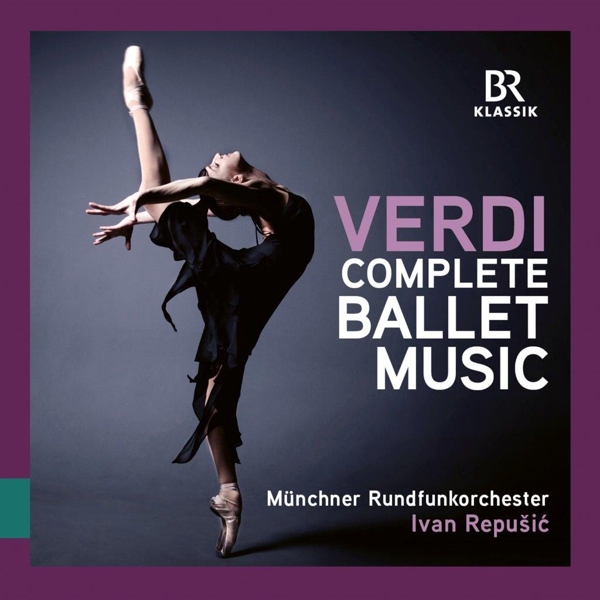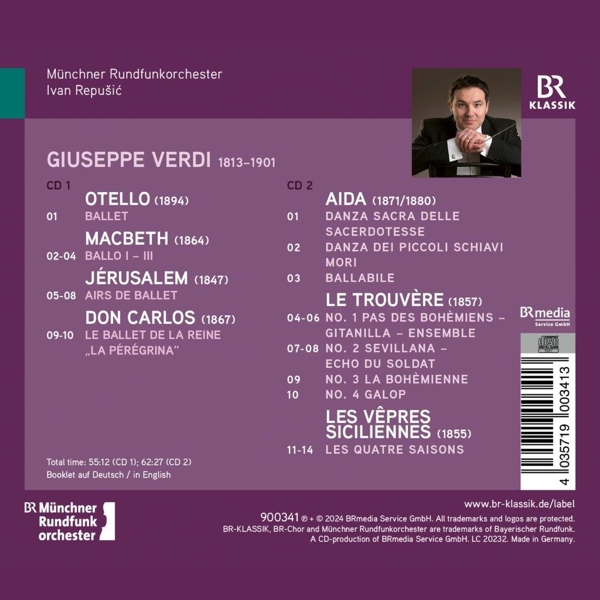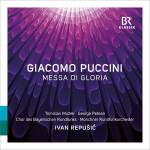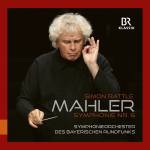Your search:
No selection
Filter results:
|
 |
| Details / Tracklist: |
Disc 01
Otello (Othello, Oper in 4 Akten) (Auszug) 01. "Ballett: Danse turque - Chanson arabe - Invocation ? Allah - Chanson grecque - La Muranese - ... (3. Akt)" 01. "Ballett: Danse turque - Chanson arabe - Invocation ? Allah - Chanson grecque - La Muranese - ... (3. Akt)"
Macbeth (Oper in 4 Akten) (Auszug) 02. "Ball Nr. 1: Allegro vivacissimo (3. Akt)" 02. "Ball Nr. 1: Allegro vivacissimo (3. Akt)" 03. "Ball Nr. 2: Allegro - Andante - Allegro" 03. "Ball Nr. 2: Allegro - Andante - Allegro" 04. "Ball Nr. 3: Walzer: Allegro vivacissimo" 04. "Ball Nr. 3: Walzer: Allegro vivacissimo"
Gerusalemme (Jerusalem, Umarbeitung von Die Lombarden, Oper) (Auszug) 05. "Pas de quatre: Andante - Allegro - Allegro - Andante - Allegro - Galop (3. Akt) (Airs de ballet)" 05. "Pas de quatre: Andante - Allegro - Allegro - Andante - Allegro - Galop (3. Akt) (Airs de ballet)" 06. "Pas de deux: Allegro moderato assai - Allegro non troppo - Tempo di Valzer - Allegro vivace" 06. "Pas de deux: Allegro moderato assai - Allegro non troppo - Tempo di Valzer - Allegro vivace" 07. "Pas seul: Andante - Scherzando - Allegro moderato - Allegro" 07. "Pas seul: Andante - Scherzando - Allegro moderato - Allegro" 08. "Pas d'ensemble: Andante mosso" 08. "Pas d'ensemble: Andante mosso"
Don Carlo (Don Carlos, Oper in 5 Akten) (Auszug) 09. "Le ballet de la reine "La P?r?grina": Andante - Tempo di Valzer - Allegro agitato - Allegro brillante - ... (3. Akt)" 09. "Le ballet de la reine "La P?r?grina": Andante - Tempo di Valzer - Allegro agitato - Allegro brillante - ... (3. Akt)" 10. "Finale: Prestissimo" 10. "Finale: Prestissimo"
Disc 02
Aida (Oper in 4 Akten) (Auszug) 01. "Danza sacra delle sacerdotesse (1. Akt)" 01. "Danza sacra delle sacerdotesse (1. Akt)" 02. "Danza dei piccoli schiavi mori (2. Akt)" 02. "Danza dei piccoli schiavi mori (2. Akt)" 03. "Ballabile (2. Akt)" 03. "Ballabile (2. Akt)"
Il Trovatore (Der Troubadour, Oper in 4 Akten) (Auszug) 04. "Pas des Beh?miens: Allegro (3. Akt)" 04. "Pas des Beh?miens: Allegro (3. Akt)" 05. "Gitanilla: Allegro" 05. "Gitanilla: Allegro" 06. "Ensemble: Allegro" 06. "Ensemble: Allegro" 07. "Sevillana: Allegro vivo - Andante mosso - Allegro" 07. "Sevillana: Allegro vivo - Andante mosso - Allegro" 08. "Echo du soldat: Allegro sostenuto - Allegro - Allegro vivo" 08. "Echo du soldat: Allegro sostenuto - Allegro - Allegro vivo" 09. "La Boh?mienne: Allegro - Solo de la Boh?mienne: Ritenuto" 09. "La Boh?mienne: Allegro - Solo de la Boh?mienne: Ritenuto" 10. "Galop: Allegro vivace" 10. "Galop: Allegro vivace"
I vespri siciliani (Die sizilianische Vesper, Oper in 5 Akten): Die vier Jahreszeiten (Ballettmusik) 11. "L'hiver (3. Akt)" 11. "L'hiver (3. Akt)" 12. "Le printemps" 12. "Le printemps" 13. "L'?t?" 13. "L'?t?" 14. "Lautomne" 14. "Lautomne"
|
 | | Number of discs: |
2 |
 | | Description: | Following the conventions of the Paris Opéra, Giuseppe Verdi was also obliged to compose ballet music for the French premieres or first performances of his stage works. Between 1847 and 1894, he wrote a total of seven so-called divertissements, some extensive, for Jérusalem, Les vêpres siciliennes, Le trouvère, Macbeth, Don Carlos, Aida and Otello. With catchy melodies, lively, accentuated rhythms, descriptive sound effects and vivid gestures, but above all with incredibly colourful instrumentation, he succeeded in giving new impetus to the ballet music of his day. While the ballet music was generally omitted from productions of Verdi's operas for a long time - with the exception of Aida - it has recently been performed increasingly often and linked to the dramaturgy of the respective work. These beautiful, well-crafted pieces of music should no longer be withheld from the public. On the new double CD from BR-KLASSIK, the Munich Radio Orchestra and its chief conductor Ivan RepuÅ¡i present Verdi's complete ballet music.In 19th-century Italian operas, a ballet was not part of the composition but was performed either between the acts or after the opera performance â?? and was usually a work created by a ballet composer who had little or no connection to the operatic work in question. The strict convention at the Paris Opéra, however, was that an extensive dance interlude had to be included as a divertissement in the third act of a grand opéra. So if an Italian opera composer wanted to have his works performed in Paris (and who would not, given the international importance of that great opera house in Europeâ??s leading musical metropolis), ballet music had to be provided as well. In the case of works originally written for the Paris Opéra, the ballet was included in the French-language libretto from the outset, and ballet music also had to be newly added to all existing works as well. Italian opera composers such as Rossini, Donizetti and Verdi were hardly ever enthusiastic about this French preference for extensive dance interludes in the third act, but they had to bow to convention.Verdi's ballet music for Les vêpres siciliennes (Les quatre saisons - The Four Seasons) and Jérusalem was the most extensive he created. In the dance sequence composed for Le trouvère, which utilises musical material from the gypsy scenes, he created a close musical and dramaturgical link with the stage action. He composed extensive ballet music for Macbeth to illustrate the Hecate scenes of Shakespeare's drama. In the third act of Don Carlos, a Ballet de la Reine entitled La Pérégrina is performed in Queen Elisabeth's gardens to celebrate the coronation anniversary of the Spanish King Philip the following day. And for the premiere of Aida in Cairo, there were no obligations regarding the design of the dance interludes, which is why Verdi probably came closest to his ideal of linking the dances as directly as possible to the operaâ??s plot. His shortest ballet music, with oriental-sounding dances, was composed for Otello. - Following the conventions of the Paris Opera, Giuseppe Verdi was also obliged to compose ballet music for the French premieres or first performances of his stage works. Between 1847 and 1894, he wrote a total of seven so-called divertissements, some extensive, for Jerusalem, Les vêpres siciliennes, Le trouvere, MacBeth, Don Carlos, Aida and Otello. With catchy melodies, lively, accentuated rhythms, descriptive sound effects and vivid gestures, but above all with incredibly colourful instrumentation, he succeeded in giving new impetus to the ballet music of his day. While the ballet music was generally omitted from productions of Verdi's operas for a long time - with the exception of Aida - it has recently been performed increasingly often and linked to the dramaturgy of the respective work. These beautiful, well-crafted pieces of music should no longer be withheld from the public. On the new double CD from BR-KLASSIK, the Munich Radio Orchestra and it's chief conductor Ivan Repusic present Verdi's complete ballet music.In 19th-century Italian operas, a ballet was not part of the composition but was performed either between the acts or after the opera performance - and was usually a work created by a ballet composer who had little or no connection to the operatic work in question. The strict convention at the Paris Opera, however, was that an extensive dance interlude had to be included as a divertissement in the third act of a grand opera. So if an Italian opera composer wanted to have his works performed in Paris (and who would not, given the international importance of that great opera house in Europe's leading musical metropolis), ballet music had to be provided as well. In the case of works originally written for the Paris Opera, the ballet was included in the French-language libretto from the outset, and ballet music also had to be newly added to all existing works as well. Italian opera composers such as Rossini, Donizetti and Verdi were hardly ever enthusiastic about this French preference for extensive dance interludes in the third act, but they had to bow to convention.Verdi's ballet music for Les vêpres siciliennes (Les quatre saisons - The Four Seasons) and Jerusalem was the most extensive he created. In the dance sequence composed for Le trouvere, which utilises musical material from the gypsy scenes, he created a close musical and dramaturgical link with the stage action. He composed extensive ballet music for MacBeth to illustrate the Hecate scenes of Shakespeare's drama. In the third act of Don Carlos, a Ballet de la Reine entitled La Peregrina is performed in Queen Elisabeth's gardens to celebrate the coronation anniversary of the Spanish King Philip the following day. And for the premiere of Aida in Cairo, there were no obligations regarding the design of the dance interludes, which is why Verdi probably came closest to his ideal of linking the dances as directly as possible to the opera's plot. His shortest ballet music, with oriental-sounding dances, was composed for Otello."Verdi - Ballett-Musiken" is a captivating CD release featuring the Munich Radio Orchestra under the baton of Ivan Repu?i?, presented by the esteemed label BR-Klassik. This album brings together some of Giuseppe Verdi's most enchanting ballet music, offering listeners an opportunity to experience his operatic genius in a new light. The selection includes ballets from famous operas such as "Macbeth," "Aida," and "Don Carlo," showcasing Verdi?s flair for dramatic orchestration and melodic invention beyond his celebrated vocal works. The Munich Radio Orchestra, renowned for its versatility and precision, delivers these pieces with both elegance and energy under Repu?i??s inspired direction. Ivan Repu?i? has established himself as one of Europe?s leading conductors, acclaimed for his interpretations of Italian opera repertoire and collaborations with major European orchestras. BR-Klassik stands out as a prestigious classical music label associated with high-quality recordings that capture both tradition and innovation; their releases are highly regarded among connoisseurs worldwide. |  | | Manufacturer No.: |
900341 |
 | Product Safety
Responsible Person for the EU:
BRmedia GmbH
Hopfenstr. 4, 80335 München, DE
info@br-media.de |  |
|
Customers who bought this product also purchased
There are currently no product reviews.
|  |
|
|
 |
|


















![Mariss Jansons / Chor & BRSO - Mariss Jansons-The Edition [DE-Version, Regio 2/B]](https://img.grooves.land/images/cover/200/900/c7hau962.j11)



